|
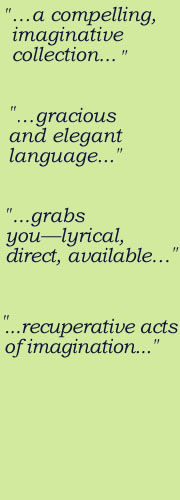
|
Creative Nonfiction Debut:
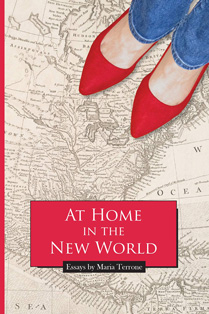 At Home in the New World At Home in the New World
Opening essay listed as a Notable Essay in Best American Essays 2019
 Buy Now Buy Now
In this thoughtful collection of essays, Maria Terrone lyrically reflects upon the vicissitudes of memory, the quicksand of identity, and the trappings of time. Terrone finds firm footing in the New World, but never steps far from the Old, the Sicilian landscape her family left behind. As Terrone joyfully claims her name and place in the world, the reader embarks on this journey with her, fortified by her hard-earned wisdom, and subsequently feeling a little less alone.
— Maria Laurino, author of The Italian Americans: A History and Were You Always an Italian?
I love this collection of essays by Maria Terrone, an exceptionally talented woman who grew up in Jackson Heights, Queens, with maternal roots firmly established, as she shows us, in Sicily’s long history. Subtly crafted, witty, honest, it brings to life a New York one instantly recognizes: an international city, ranging from the factories of Long Island City to a Fifth Avenue beauty company to shooting ranges to Catholic schools. A world where a woman might lose herself in preparing foods from many countries to dreaming of fashionable clothes and out-of-this world watches and shoes, while taking those graffiti-soaked subways to summer jobs in New York’s cubicles and windowless offices. All of it memorably realized here on page after page in a language which only really fine poets can evoke, realizing for us, her lucky readers, a world shared in truth by so many of us.
— Paul Mariani, author of The Whole Harmonium: The Life of Wallace Stevens
Maria Terrone points her writing directly at the difficult and powerful material of the edges of ordinary life: a small hospitalized child being threatened by a nurse, horror stories from Vietnam, stories of a POW in a Japanese camp. But much more than that. Why does a beloved brother have a love affair with guns and shooting? What does it mean to explore our own fears unflinchingly? Her writing penetrates the underworld from the subway to the unconscious, from family to beyond, sometimes employing wry humor to examine her personal obsessions and her place in the “new world” of 21st century America. You will sink into these essays and be rapt with attention. A fine book.
— Joanna Clapps Herman, author of The Anarchist Bastard

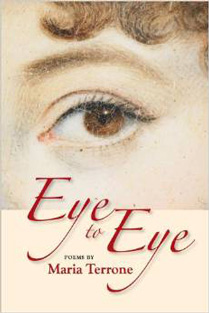 Eye to Eye Eye to Eye
 Buy Now Buy Now
Maria Terrone's poems are simultaneously sensuous and spiritual, earthy and intellectual. Her imagination takes fire from contradiction and complexity. One small image—washing a potato or rearranging a lingerie drawer—can open up vistas of private desire or public history. Her poetry explores the contingencies of time and eternity, the mysterious interpenetration of reality and the imagination.
— Dana Gioia
As alert to the edgy political nature of contemporary reality ('the names of nations changing/ as people revolt and take aim') as they are to the luminous energies of ordinary facts, or the hard truths of the body's own shocking vulnerability, or the complicated inheritance drawn from her beloved Italian ancestry, Maria Terrone's poems see 'eye to eye' with a world she can at once celebrate and grieve over, but for which she shows a deep, empathetic, richly articulate understanding.
Thoughtful, grounded, even visionary at times, her language in this mature third collection is a kinetic mix of keen-eyed observation and unsentimental judgment. In one poem she sees 'gnarled hawthorn trees that lean/towards me like question marks.' As a poet she lives, like the rest of us, in a world of questions marks—but what shines through them is the fierce light of the life force itself, telling her 'it's possible for a body to float on joy.'
— Eamon Grennan
"Maria Terrone's eyes and ears are honey, and her touch is 'near enough to lift each hair on my skin.' Through trauma and joy her nuanced and evocative poems are insistent and alive. Terrone pinpoints unforgettable moments and we can feel the shock of discovery as she enacts how 'to suspend your life for another.'"
— Annie Marie Macari

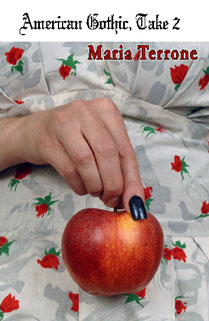 American Gothic, Take 2 American Gothic, Take 2
-- Chapbook, 28 pages
 Buy Now Buy Now
In a voice that beguiles and surprises at every turn, part Marianne Moore, part Emily Dickinson, Maria Terrone enchants us in this new book of poems. The poems take us to Italy, to Montauk, Long Island, and to dream landscapes in which the Beatles throw a party at an ancient temple and Albert Einstein crosses Queens Boulevard. And all the way, through these poems, Maria Terrone is our guide, both wickedly funny and deeply serious. “Scatter your sequins,” she directs us. “Then exit,/ tap dancing backwards in code.” This is a delightful new collection from an important voice in contemporary American poetry.
— Nicole Cooley, author of The Afflicted Girls and Resurrection, winner of the Walt Whitman Award.

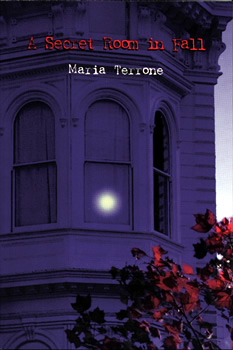 A Secret Room in Fall A Secret Room in Fall
Winner of the Robert McGovern Prize from Ashland Poetry Press
 Buy Now Buy Now
Whether confronting matters close to home and family, taking in gritty facets of the urban landscape, or bringing to sympathetic light anonymous, mainly female workers in the shadows and giving each her moment of perfectly articulated presence, Maria Terrone’s poems are quietly insistent, recuperative acts of imagination. At times spiced by a wry humor, at times opening to small touches of rapture (“I rise daily, a miracle”), this Secret Room in Fall suggests a world that is one “dense, resplendent cargo,” of which the poet takes exacting, loving stock.
— Eamon Grennan
Even over-familiar subjects like 9-11 are transformed in Maria Terrone’s imagination to fresh, intriguing journeys. New York and Italy, modern life and distant history are acutely observed, leading the reader into “secret rooms.” Pedicurists, workers of many sorts, artists and widows are all shown striving for some transcendence, some unnamable beauty. Like “a brilliant kaleidoscope, the sea we hold within / will allow us to sail through our own lives, / unharmed.” In such declarations Terrone speaks for us all.
— David Mason
A Secret Room in Fall is a compelling, imaginative collection not to be missed. The poems move easily among their many contexts--history, literature, autobiography, travel, and subtly loving, persuasive portraits. The manuscript opens with an Egyptian queen asserting the tricky ubiquitousness of the dead, and goes on to surprise and delight with other unexpected speakers and odd conclusions. Its people--Blanche, fanciful namer of colors; a handicapped man on a train platform; obliviously happy young lovers carting their mattress in the subway; "The Woman Ironing"--all acquire biographies through the situations assigned them and the details that give them a hold on the reader's attention and memory.
As an immigrant with an insider's understanding of the diversity of America, I responded viscerally and joyously to "The Fruited Plain," without missing the poem's hints of hopes unfulfilled and dreams often deferred.
This is a rich, generous serving of the fruits of poetic observation, of attention to “voices from other rooms” that speak of realities beyond what can be perceived.
— Rhina Espaillat
This is lively and incisive new work.
— Maxine Kumin

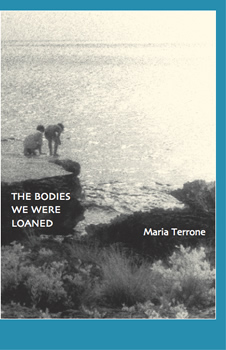 The Bodies We Were Loaned The Bodies We Were Loaned
 Buy Now Buy Now
“Maria Terrone’s scrupulously crafted, suavely cadenced poems record telling details of the quotidian world with such vividness that after a while we begin to hear “the rush” of the “hidden/city” of the heart, “its roar and raging heat, the wild/dark needed to become human.”
The Bodies We Were Loaned is a triumph of meticulous sorrow.”
— Sandra Gilbert
It is "the body's unequivocal language" that Maria Terrone aspires to in this maturely achieved first collection. In language precise in its physicality and thought, she celebrates ordinary work and those who perform it, admiring the tough, the common, what endures. As keenly attuned to what is going on in works of art as in the emotional states she observes in herself and those around her, her poems become notations of mood, intensely alive to the passing moment, and to all those momentary things that are, by the force of her observation, "dipped in light." Acknowledging the body in its darker moments, caught in "the jail of itself," she can also honor the "word made flesh" of old love letters, or the rich delight of saving an injured bird that's "homeless, hungry, broken-legged, maybe heaven sent." What I especially like is her refined appetite for the world, able to see and state clearly (in a love poem called "Strawberries") the "simple truth of these berries, ripe/just with the meaning of themselves."
— Eamon Grennan
In the Bodies We Were Loaned, Maria Terrone presents us with sensuous and sensitive poems that explore the presence of the extraordinary in the ordinary. This powerful, moving book is a love song to the wounded world.
— Maria Mazziotti Gillan
Count on it: a poem by Maria Terrone entices. In her first book, The Bodies We Were Loaned, expect surprises. Maria loves the exotic of now and long ago, the local landscapes of the globe. But she especially loves New York, and reading her splendid poems, I ask, Why not? They capture the joy in sounds and images so vivid, I'm there. I love all the poems in this collection.
— Walt McDonald
Here the poetry starts before we even open the book. The title The Bodies We Were Loaned was apropos before the events of September 2001 made it electric with a raw new relevance. We savor what we know will pass, long for what is passing--be it a Chinese emperor, a sandhog or "a
prophet in flame red lipstick." Here we find them all. Here we also find eloquence without a hint of the facile, a naturalist's eye avid for textures and detail, and a heart prepared to evoke "the body's unequivocal language." These fine poems are a delight to recommend.
— William Pitt Root
 |

